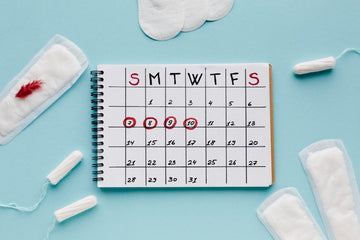Excessive bleeding during periods, medically formerly known as Menorrhagia, is a condition that affects countless girls but is often misunderstood. Many can withstand a powerful menstrual current, although it may indicate underlying fitness problems. From hormonal imbalance and uterine disorders to coagulation questions and lifestyle elements, diverse and often hidden. Understanding persistent symptoms can lead to fatigue, anemia, and a lower survival rate. Understanding the causes of heavy periods is necessary not only for alleviating symptoms but also for maintaining regular reproductive health and long-term well-being.
What is Excessive Bleeding During Periods?
Excessive bleeding during periods, in addition referred to as menorrhagia, reflects heavier or longer menstrual bleeding. This is more than a heavy weight; it involves absorbing or using more sanitary pads or tampons every hour continuously, passing large blood clots, or experiencing periods for more than seven days.
Women with menorrhagia experience menstrual cramps, fatigue, and, in some cases, symptoms of anemia, including respiratory issues and discomfort. Although current heavy bleeding can be normal, continuous or acute menstrual bleeding is mostly a sign of an underlying medical condition that requires medical attention.
Impact of Excessive Bleeding During Periods
Excessive bleeding throughout the gap will have a major impact on the physical, emotional, and social conditions suitable for a woman. Physically, it can lead to iron deficiency anemia, period fatigue, shortness of breath, and weakness, which can interfere with everyday activities. Regularly wanting to exchange sanitary products and the manipulation of leaks can cause anxiety and affect sleep, work, and social life.
-
Concerns are almost leaked due to regular fear or to deal with the flow in public surroundings.
-
Surprisingly, bleeding or blurry clothing craftsmanship.
-
Less pride, especially if the situation affects workouts or social interactions every day.
-
Delay of necessary measures, women may suffer extra silence
-
This can lead to a sense of isolation or helplessness.
What are the Causes of Excessive Bleeding During Periods?
Hormonal Imbalance
Hormones play an important role in regulating menstruation. An imbalance between estrogen and progesterone, two primary female reproductive hormones, can cause uterine fibroids, which can result in severe bleeding. This hormonal imbalance is common during life, especially in formative years and perimenopause, when the hormone levels change very clearly. Without proper hormonal balance, the body struggles to maintain a healthy menstrual cycle.
Uterine Fibroids
Uterine fibroids are non-cancerous tumors that develop in or outside the uterus. Depending on their periods and region, they can interfere with the daily contraction of the uterus during menstruation, leading to long-term and severe bleeding.
Uterine Polyps
The uterine polyps are small, soft, gentle growths in the uterine mucosa (endometrium). They can disrupt the usual shedding process of the mucosa, irregular and from time to time, and provoke severe menstrual bleeding.
Endometriosis
Endometriosis occurs when tissue similar to the uterus grows outside the uterus, usually on the ovaries, fallopian tubes, or other areas. This on-site tissue is thick, breaks apart, and bleeds under each menstrual cycle. However, it cannot escape the body, causing infection, excessive cramps, and heavy premenstrual periods. Endometriosis is a chronic and often painful condition that can also affect fertility.
Polycystic Ovarian Syndrome (PCOS)
PCOS is a hormonal disease characterized by the presence of more than one cyst at a high level in the ovaries, irregular ovulation, and androgen (male hormones). Women with PCOS may experience unusual periods, and when menstruation occurs, it can be surprisingly heavy due to the construction of the uterine feed in the long cycle. PCOS also contributes to zits, weight gain, and insulin resistance.
Natural Remedies and Tips to Control Excessive Bleeding
-
Natural means and suggestions to control excessive bleeding
-
Include date-rich foods such as dates, spinach, lentils, and beets.
-
Add the rich material to the vitamin C to increase iron absorption.
-
Drink water and other fluids to maintain hydration and reduce fatigue. Applying ice compression to the lower stomach for 15-20 minutes can help constrict blood vessels and reduce inflammation.
-
Chronic stress can affect hormone levels; To remain calm, practice meditation, deep breathing, or ironing.
-
Keeping a period diary or using a menstrual monitoring app provides surveillance of flow style and triggers.
-
Overweight or rapid weight loss can affect hormonal stability and lead to severe bleeding.
When Should You Search For A Doctor?
If you interfere with your daily life, you are constantly experiencing vigorous menstruation. Indicating signals include soaking in one or more pads through one or more pads or tampons for several hours, applying double security, passing large blood clots, or for a period that lasts for more than seven days and also even you can try heavy flow pads in this instance.
In addition, if you experience symptoms such as severe pelvic pain, fatigue, dizziness, or shortness of breath, this may be anemia or an underlying condition. Any unexpected changes in your menstrual test, especially after years of simple cycles, should be assessed by a health care provider for proper diagnosis and treatment.
Treatment Options For Excessive Bleeding During Periods
Excessive bleeding during periods, also known as Menorrhagia, can have a major impact on a person's everyday life and health. Treatment options are based on the underlying cause, severity, age, and reproductive goals. Originally, doctors could also advise lifestyle adjustments and iron diets to control anemia due to severe bleeding.
Non-steroidal anti-inflammatory medications (NSAIDs) such as ibuprofen can help reduce blood clots and pain. Hormonal treatment plans, including capsules for appearance, hormonal IUDs, or progesterone therapy, are usually used to change the menstrual cycle and reduce bleeding.
Conclusion
In conclusion, immoderate bleeding during periods, additionally known as menorrhagia, is a situation that must no longer be ignored. While hormonal imbalances, fibroids, polyps, or underlying medical conditions like thyroid problems and bleeding issues are commonplace causes, lifestyle factors and pressure can also contribute. Identifying the root purpose is crucial for effective treatment and overall well-being. If you experience unusually heavy periods, extended bleeding, or fatigue, seek advice from a healthcare expert for timely analysis and care. Early intervention can improve the quality of life and prevent conditions like anemia. Awareness and open conversations about menstrual health are crucial to breaking the stigma and promoting overall well-being.
FAQ’s
What Is Considered Excessive Bleeding During The Period?
Excessive bleeding, or mendrazia, when sucking through one or more sanitary pads or tampons every hour continuously, bleeding for more than 7 days, or passing large blood clots.
What Are The Hidden Causes Of Heavy Periods?
Cancer, uterine fibroids, polyps, endometriosis, adenomyosis, thyroid disorders, bleeding disorders, and in rare cases, can cause heavy periods.
Can Stress Or Lifestyle Affect Severe Menstrual Bleeding?
Yes, stress and poor lifestyle habits can affect hormone levels, possibly irregular, or lead to severe menstrual bleeding.
When Should I See A Doctor About A Heavy Period?
If your period causes abnormally heavy, long-lasting fatigue or interferes with your everyday life, or if you experience dizziness or shortness of breath, consult a doctor.
Can Heavy Periods Affect Fertility?
Yes, some causes of severe bleeding, such as endometriosis or hormonal disorders, can affect fertility when not treated.





